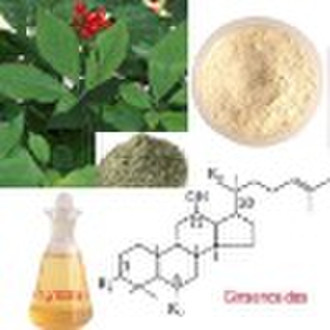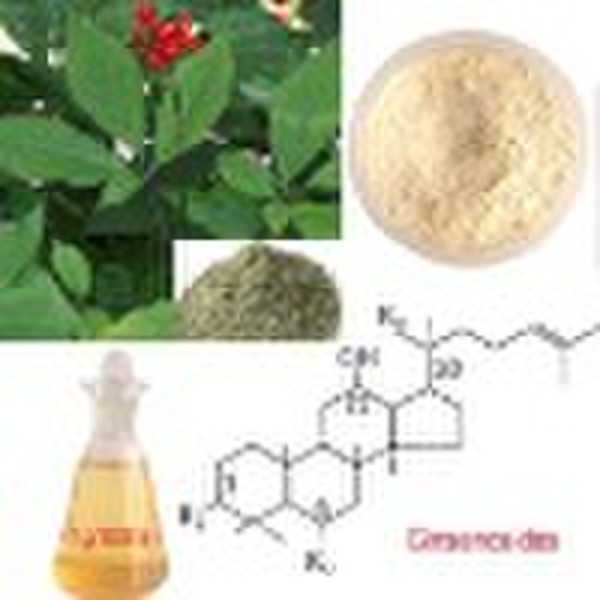Panax人参摘要
原价: 10,00 USD
深圳宝安国际机场, 中国
生产能力:
20000 公斤 / 年

Huashun Xu
联系人姓名
基本信息
| 包装 | Bottle |
|---|---|
| 出生地 | Guangdong China (Mainland) |
| 年级 | First Grade |
| 牌子的名字 | NATURACTIVE |
| 模式的数量 | NAT_008 |
| 类型 | 草药中提取 |
| 形式 | 粉 |
| 开采的型 | 溶剂萃取 |
Panax Ginseng Extract Latin Name: Panax Ginseng C.A.Meyer Common Name: Panax Ginseng, Ren Shen Part Used: Herb/Root/ Fruit Active Ingredients: Ginsenosides 5-95% Appearance: Yellow-white Powder Testing Method: HPLC/UV Background: Ginseng is a fascinating herb that was discovered in China around 5,000 years ago. It is a unique plant to grow commercially. Unlike many other crops, the plant never has been domesticated. Therefore, ginseng must be grown under wild or simulated wild conditions. There are two major ginseng species: Asian ginseng (panax ginseng) and American ginseng (panax quinquefolium). The differences between American and Asian ginsengs are well documented not only by Chinese traditional doctors, but also by modern scientists, It is found that the differences in the active, constituents may account for the differing medecinal uses of American and Asian ginseng. People found that the types of saponins in American ginseng are similar to those in Asian ginseng, the exceptions that ginsenosides Ra and Rf found in Asian ginseng are absent from American ginseng. There are some differences in quantity of ginsenosides Rg and Re groups between American ginseng and Asian ginseng. Furthermore, the relative abundance of panaxadiols and panaxatrios differs in the two ginseng species. American ginseng contains very few ginsenosides with central nervous system stimulating activity, it is regarded as a "cooling agent". But whether asian ginseng or American ginseng, It is true that ginseng possesses real value for improvement of human health. Key Active Ingredients: There is one of key active ingredients called ginsenosides, considered "marker" compounds for ginseng, which can indicate the type and quality of ginseng present in a product. Ginsenosides is main composed of Ra1 3, Rb1 3, Rc, Rd, Re, Rf, Rg1 3.Function: Ginseng increases resistance to the effects of stress and improves circulation and mental functioning. Health conditions contributed to be stress include increased acidity of the body chemistry, back pain, cancer, Crohn's disease (inflammation of the intestinal tract), depression, chronic diarrhea, digestive disorders, hair loss, headaches, hypertension or high blood pressure, impotence, insomnia, TMJ syndromes (jaw pain and clicking), nervous and anxiety disorders, obsessive compulsive behaviors, various skin conditions, and finally, ulcers. Ginseng has shown cancer-preventive effects and may reduce the risk of several types of cancer. One study found that among more than 4,600 people over the age of 40, ginseng users were approximately 70% less likely to develop cancer compared to those who did not take the herb. They also found that the more frequently ginseng was consumed, the lower the risk of getting cancer was. Ginseng may help people with type 2 diabetes control blood sugar levels. One study showed that in the diabetics, ginseng lowered blood sugar 20% more than placebo pills. Among those who did not have diabetes, there was also a similar drop in blood sugar levels. Ginseng has a street reputation as an ancient aphrodisiac. Scientists concluded that ginsenosides may work in a similar way to Viagra. And some people uses ginseng in pills to treat premature ejaculation. Biologically, ginseng has been shown to allow cells to more readily use stored sugar, enabling red blood cells to carry more oxygen. So ginseng can enhance sports performance and that has been testified.Dosage: Experts suggested Ginseng root extracts are recommended at 150-200 mg daily with three meals.Safety: Used in the recommended amounts, ginseng is generally safe. In rare instances, it may cause over-stimulation and possibly insomnia. Consuming caffeine with ginseng increases the risk of over-stimulation and gastrointestinal upset. People with uncontrolled high blood pressure should use ginseng cautiously. Long-term use of ginseng may cause menstrual abnormalities and breast tenderness in some women. Ginseng is not recommended for pregnant or breastfeeding women. Testing Items: Appearance: Yellow-white Powder Pesticides: ≤10μg/kg Taste: bitter Heavy Metals:<10mg/kg Water-solubility: 100% soluble Arsenic (as As2O3) :<1mg/kg Sieve Analysis: 100% pass 80 mesh Total Bacteria Count:<1000cfu/g Ginsenosides(UV): ≥80% Yeast & Mold:<100cfu/g Moisture: ≤5.0% E.Coli.: Negative Ash: ≤5.0% Salmonella: Negative
交货条款及包装
Packaging Detail: 25 kgs/drum inner double plastic bags. Delivery Detail: 7 days after confirming the order.
端口: Shenzhe/China
付款条款
Letter of credit
Telegraphic transfer
-
支付方式
我们接受:









